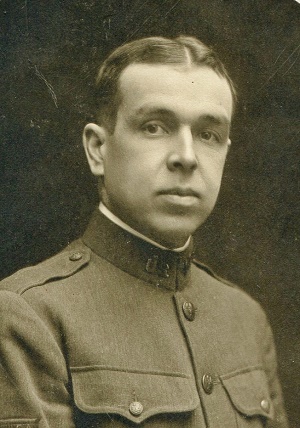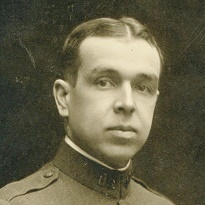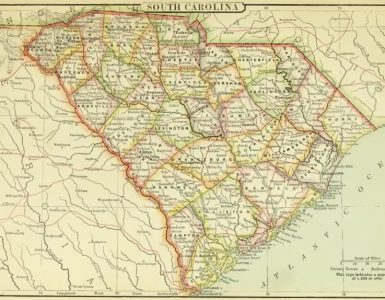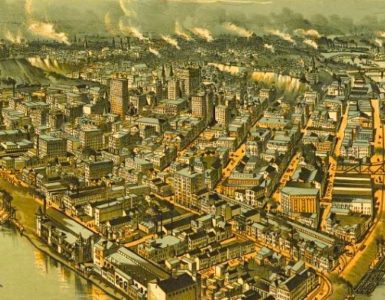 If you have not read the first part of this series you may want to do so by visiting “J. Gresham Machen, France 1918.”
If you have not read the first part of this series you may want to do so by visiting “J. Gresham Machen, France 1918.”
After landing at the dock in France following a long and uneventful journey, Machen was escorted along with his travelling companions by a YMCA man on a night train to Paris. Lodging was obtained by him in a small hotel in a quiet neighborhood near the Etoile, and then for a few days he attended orientation sessions at the YMCA headquarters. When he was interviewed by an administrator regarding the work he would like to do, Machen the minister expressed his desire to work with the soldiers at the front, but he was instead assigned to work as a hut secretary. The American and French branches of the YMCA were cooperating to operate “Foyers du Soldat” which were places where soldiers could buy snacks, tobacco products, and beverages while participating in card games, music, and sports activities. Even though it was not what he preferred, Machen commented, “It is a glorious chance, it seems to me, humble as the functions of the secretary might be to some people.”
Secretary Machen was not able to immediately travel to his assignment because of delays caused by wayward military paperwork. He remained in Paris for over two weeks, but he did not let the time go wasted. Study of the French language and enjoyment of Paris itself filled his time. Paris seemed unphased by the war even though it was not that far away. Occasionally in the city aircraft were seen and troops on leave wandered the streets, but generally speaking, Paris was still Paris. Machen moved out of the hotel after a short stay and rented a room from the widow of a Protestant pastor. Because he was diligently studying French, the new residence offered a golden opportunity to converse and practice. He honed his French as he dined with widow Lalot, visited local sites, conversed with Parisians, and attended theater performances.
 Over two weeks after he learned what his assignment would be, Machen finally went to his hut and began working with a French colleague name Pia. Machen’s part of the operation was to run the snack bar. The reality of war had confronted him when he left Paris and travelled through the countryside to his post. All along the way he had seen bombed-out buildings, shell craters, damaged artillery, and the general debris of war. Due to the constant threat of a chemical gas attack, Machen, like everyone else at the front, had a gas mask for an annoying appendage on his belt, but it was an absolutely necessary companion. As his work in the hut continued, Machen commented that “one day is very much like another” and when troops visited the hut his number of work hours could extend from dawn to well past dusk. Added to other difficulties he faced was a shortage of sugar and chocolate which were needed to make hot chocolate for the soldiers. The spring of 1918 in the region was a particularly cold and wet one, so anything hot to drink was in high demand.
Over two weeks after he learned what his assignment would be, Machen finally went to his hut and began working with a French colleague name Pia. Machen’s part of the operation was to run the snack bar. The reality of war had confronted him when he left Paris and travelled through the countryside to his post. All along the way he had seen bombed-out buildings, shell craters, damaged artillery, and the general debris of war. Due to the constant threat of a chemical gas attack, Machen, like everyone else at the front, had a gas mask for an annoying appendage on his belt, but it was an absolutely necessary companion. As his work in the hut continued, Machen commented that “one day is very much like another” and when troops visited the hut his number of work hours could extend from dawn to well past dusk. Added to other difficulties he faced was a shortage of sugar and chocolate which were needed to make hot chocolate for the soldiers. The spring of 1918 in the region was a particularly cold and wet one, so anything hot to drink was in high demand.
After having experienced the war with its destruction and tragedies for about a month, Machen expressed his plan to become an advocate for peace when the war ended.
If this war is ever concluded in a really satisfactory way, I am going to be an active worker for peace. And the kind of work that I believe might really be effective is the work of moral education in all the languages of the world. War is righteous when it is conducted as in France for the delivery of women and children and the repelling of an invader. But how any human being can have the heart or the absence of heart to continue this war for one moment merely for conquest reveals to my mind as nothing else in the world the abyss of sin.
As Machen viewed the pervasive devastation, he, as a Christian minister, hoped for future peace and the end of war. He found personal comfort and reassurance particularly in the book of Psalms. Often in the letters sent home he mentioned the importance of the psalms and their particular relevance to times of war.
In the middle of March, he was transferred to another post which was about ten miles from the location of the first hut. It was a larger and more substantial building in a more bustling area than his first hut. The village itself was in shambles due to its having been destroyed by the French when they bombarded it to end a two-year occupation by the Germans. Machen’s new assignment was much like the old one in that he continued to make hot chocolate as he could despite intermittent difficulty obtaining the ingredients.
One hundred years ago today, March 28, in a letter to his brother Arly, he commented that what would make him most happy would be two-hundred kilos (440 pounds) of sweet chocolate. The shortages were exacerbated by the large crowds of soldiers that came to the hut for refreshments, and because the hut was located by a busy road resulting in travelers stopping for snacks and refreshments.
BARRY WAUGH
To continue on to part 3, click HERE.





